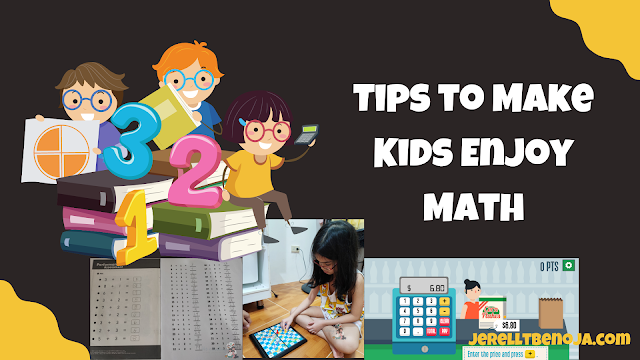Kids are like sponges. They mirror what they see us doing. And more often than not, they take everything we say as the absolute truth. I remember reading an article saying that we, parents, should stop being too critical of how we look, because kids will also end up doing the same. I believe this does not only apply to our physical appearance.
My husband and I took Computer Engineering in college, and we keep on telling Zayne how much we enjoy math. I even told Zayne that contrary to popular belief, math is actually an easy subject; that’s why I love it. I know that a lot of parents don’t share the same sentiment. But if you want your child to enjoy math, you should stop badmouthing it. You can still hate math, but try your best not to say it in front of your child. Hihi!
2. Tell them the importance of math.
When Zayne was starting to show aversion to math, she tried to convince us that it was useless. We told her that math is everywhere. I remember telling her, “When you ride the jeepney or pay for the groceries, you need to know addition and subtraction. Otherwise, you wouldn’t know if they gave you the correct change. When you cook or bake, you need to know fraction. When you become a doctor, you need math to know how much medicine you need to give your patient.” Zayne started giving other professions like an artist and a YouTuber, and I was still able to give her examples on how these people need math in their lives. :p
3. Start with the basics.
I was so perplexed when I saw that Zayne’s first math lesson in school was about primary colors. I thought it should be for the arts. When they discussed secondary colors, I then realized that it was introducing the concept of addition to kids.
Before Zayne started formal schooling, I enrolled her in a Play Math course, which was scheduled for one hour a week. I was able to talk to the head teacher at that time, and she explained to me that parents’ first mistake was teaching kids how to write the numbers right away. She said that the numbers are simply foreign figures for kids. Her worksheets were mostly coloring, writing straight and curved lines, and connecting dots. Apparently, this is to prepare the kid’s grip and muscles for writing. Before counting and the concept of numbers were introduced to her, she learned about comparing sizes and lengths. It’s the same as our kids’ math lessons progress. Our kids will have a hard time learning multiplication unless they master simple addition then addition with regrouping. If you see your kid struggling, always go back to basics!
4. There is power in repetition.
I remember that Zayne transitioned from Play Math to Basic Math a few months before the pandemic lockdown. Her first task was to solve basic addition. She used to complain a lot. According to her, the questions were repetitive. I told her that repetition is really important in learning everything, and that includes math.
Never underestimate the importance of play. At seven years old, Zayne still likes playing with her kitchen toys. What we normally do is pretend that she owns a restaurant. She makes a menu with prices. And when we pay her, we ask her to make sure that she gives us the right change. On some nights, we play board games. For snakes and ladders, we use two dice instead of one. This enables her to practice addition.
6. Play math games with your kid.
I know that online games are usually frowned upon by parents, but there are actually games that can help kids with math.
The game Treze Coins exposes kids to the concept of money. It also lets kids practice simple addition as they add coins to put into a gumball machine.
A great part of why I grew up loving math is because my childhood dream was to be a grocery cashier! Hihi. I spent hours playing with my cousins in my pretend grocery store. There is a game called Grocery Cashier that will help kids practice addition and subtraction. And just like Treze Coins, it also helps kids become familiar with money. I bet adults like me who wished to be a cashier when they were little will also enjoy this game.
7. Incorporate math into daily activities.
Zayne loves to help me in the kitchen. When she was still learning how to count, I would give her tasks that involved counting. “Baby, put 5 tablespoons of sugar.” Now that she already knows the concept of money, we let her do a bit of budgeting of her savings. When she wants to buy a game upgrade, we let her check if she has enough money. She also enjoys lining up in the cashier when we’re in a store!
8. When teaching math at home, try to make it fun.
We help her review when she has math exams. Apart from the traditional way of preparing her worksheets to answer, we also try to do fun activities while reviewing. There was one time when we pretended to be in a beauty pageant, and the Q & A portion had math questions! Haha!
9. Tell them the importance of their progress.
It’s inevitable for kids to be frustrated and make mistakes. Recently, Zayne felt bad when she made a mistake in a math activity at school. We assure her that it’s normal to make mistakes and that she should learn from them. When she gets frustrated with her new lessons, we remind her she didn’t even know how to count a couple of years ago, but here she is now doing word problems and four-digit addition and subtraction.
There are a lot of after-school programs that can help your kids with math. Parents should not feel shame if they want to outsource help for their kids. But if you have time in your hands or you don’t have the budget for after-school courses, I do hope that the above tips will help you.














Post a Comment